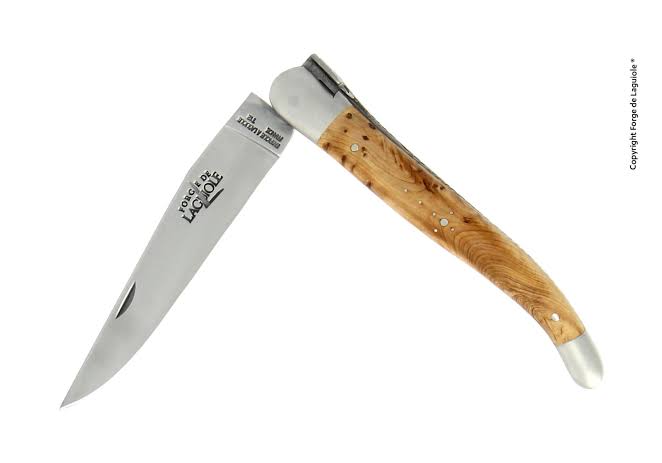Few items in the world of culinary tools carry the prestige and craftsmanship of a Laguiole knife. Originating from the pastoral region of Aubrac in Southern France, these knives have evolved from humble beginnings as practical tools for farmers and shepherds into revered symbols of artisanal excellence and fine craftsmanship. Renowned for their elegant design, impeccable quality, and rich history, Laguiole knives are not just kitchen utensils; they are cherished heirlooms and cultural icons.
Origins And Heritage
The story of Laguiole knives dates back to the early 19th century when Napoleon Bonaparte’s reign influenced the standardization and production of various tools, including knives, across France. The town of Laguiole, nestled in the Aubrac mountains, became synonymous with knife-making due to its skilled blacksmiths and metalworkers. Initially designed as multipurpose tools for farmers, these knives featured a robust blade, a distinctive handle, and a signature bee or fly motif—a symbol of the region’s local heraldry.
The traditional Laguiole knife typically includes several key elements that reflect its rural origins and artisanal roots:
Blade: Crafted from high-quality stainless steel or Damascus steel, the blade of a Laguiole knife is renowned for its sharpness, durability, and precise cutting ability. The blade may vary in length and shape, from classic folding to specialized versions for different culinary tasks.
Handle: Traditionally made from natural materials such as wood, bone, or horn, the handle of a Laguiole knife is often adorned with intricate engravings or inlays. Modern interpretations may also feature synthetic materials like acrylic or composite for enhanced durability and aesthetic appeal.
Bolsters And Spine: The bolster, a thick band of metal between the blade and the handle, provides balance and strength to the knife. The spine, or top edge of the blade, is often gently curved and meticulously finished to ensure both functionality and elegance.
Decorative Elements: Among the things that set a Laguiole knife apart was the intricate metalwork, which featured the iconic “bee” or “fly” on the spine. This embellishment is not merely decorative; it serves as a symbol of authenticity and craftsmanship, reflecting the knife’s origins in the Aubrac region.
Craftsmanship And Production Process
The production of authentic Laguiole knives remains a testament to traditional craftsmanship and meticulous attention to detail. Each knife is typically handmade by skilled artisans who undergo years of training to master the intricate techniques involved. The process can be broken down into several essential stages:
Forging And Shaping: The blade of a Laguiole knife begins as a piece of high-quality steel, which is heated, hammered, and shaped using traditional forging techniques. This stage is critical for establishing the blade’s strength, hardness, and overall shape.
Heat Treatment: After shaping, the blade undergoes a precise heat treatment process to optimize its molecular structure and enhance its cutting performance. This step requires careful control of temperature and cooling rates to achieve the desired hardness and flexibility.
Assembly And Fitting: Once the blade is prepared, it is meticulously fitted with the handle components, including the bolster, spine, and decorative elements. Skilled artisans ensure that each part aligns perfectly, balancing functionality with aesthetic appeal.
Finishing And Polishing: The final stages of production involve refining the knife’s appearance and performance. The handle is polished to showcase the inherent beauty of the materials used, and the blade is sharpened to a razor-like edge. Artisans may also engrave or embellish the knife with personalized details or markings.
Quality Control: Before it leaves the workshop, every Laguiole knife is subjected to a thorough quality control check to ensure it meets the high standards of the brand. Thanks to this painstaking attention to detail, every knife bearing the Laguiole name will continue to live up to its reputation for unmatched quality and craftsmanship.
Varieties And Specializations
While traditional Laguiole knives are celebrated for their versatility and timeless design, modern artisans have expanded the range to include specialized versions tailored to specific culinary tasks and preferences. Some popular variations include:
Folding Pocket Knives: Compact and portable, these knives retain the classic folding blade design, making them ideal for everyday use or outdoor activities.
Table Knives: Designed for dining and entertaining, Laguiole table knives feature elegant handles and finely honed blades that enhance the dining experience.
Cheese Knives: With a unique blade shape and handle design, Laguiole cheese knives are crafted to effortlessly slice through a variety of cheeses without sticking or crumbling.
Sommelier Knives: Also known as corkscrews, these multi-functional tools combine a traditional Laguiole knife blade with a built-in corkscrew for opening wine bottles with ease.
Cultural Significance And Global Appeal
Beyond their practical utility, Laguiole knives hold a special place in French culture and heritage. Recognized as a symbol of artisanal excellence, these knives are often gifted to commemorate special occasions such as weddings, anniversaries, or professional milestones. Their timeless design and impeccable craftsmanship have also garnered international acclaim, making them sought-after collector’s items and prestigious gifts worldwide.
In recent years, the popularity of Laguiole knives has extended beyond traditional markets, with discerning chefs and culinary enthusiasts appreciating their blend of functionality and aesthetics. Each Laguiole knife upholds the brand’s tradition of excellence and innovation in the culinary industry because of its dedication to quality and the use of time-honored production techniques.
Sustainability And Ethical Practices
As consumer awareness of sustainability grows, so too does the importance of ethical production practices within the knife-making industry. Many reputable Laguiole knife manufacturers prioritize sustainability by sourcing materials responsibly, supporting local communities, and minimizing environmental impact throughout the production process. By adhering to these principles, they ensure that every Laguiole knife not only meets the highest standards of quality but also reflects a commitment to preserving natural resources for future generations.
Conclusion: The Legacy Continues
In conclusion, the art of Laguiole knives represents a harmonious blend of tradition, innovation, and timeless elegance. From its humble origins in rural France to its global reputation as a symbol of craftsmanship and prestige, the Laguiole knife continues to captivate enthusiasts and collectors alike. Whether as a practical kitchen tool, a cherished heirloom, or a prestigious gift, each Laguiole knife tells a story of dedication, skill, and unwavering commitment to excellence.
As culinary trends evolve and consumer preferences shift, one thing remains certain: the enduring appeal of Laguiole knives as enduring symbols of unrivaled quality and artisanal mastery.



